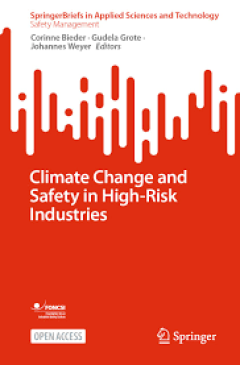Filter by

Public Participation in Governance of Industrial Safety Risks; An Uneasy Journey
Buku akses terbuka ini berkontribusi pada tren yang semakin meningkat menuju partisipasi publik yang lebih besar dalam pengambilan keputusan di banyak bidang kehidupan publik, khususnya dalam bidang lingkungan dan pembangunan berkelanjutan. Buku ini menjelaskan hasil dari workshop selama dua hari, yang diselenggarakan oleh Yayasan untuk Budaya Keselamatan Industri pada tahun 2023, yang membahas…
- Edition
- -
- ISBN/ISSN
- 978-3-031-77650-2
- Collation
- online resource ( x, 98 Pages)
- Series Title
- SpringerBriefs dalam Ilmu dan Teknologi Terapan
- Call Number
- 363.1 BIE p

Climate Change and Safety in High-Risk Industries
This open access book directs attention to the safety implications of disruptive, sustainability-driven changes in sociotechnical systems resulting from climate-change considerations in high-risk industries. It addresses not only the dismantling of currently prevalent systems and structures and the achievement of a stable future state but also the management of processes for establishing new pr…
- Edition
- -
- ISBN/ISSN
- 978-3-031-56995-1
- Collation
- VII, 98
- Series Title
- SpringerBriefs in Applied Sciences and Technology (BRIEFSAPPLSCIENCES)
- Call Number
- 620 CLI

Managing Future Challenges for Safety : Demographic Change, Digitalisation an…
This open access book addresses the future of work and industry by 2040—a core interest for many disciplines inspiring a strong momentum for employment and training within the industrial world. The future of industrial safety in terms of technological risk-management, although of obvious concern to international actors in various industries, has been quite sparsely addressed. This brief refle…
- Edition
- -
- ISBN/ISSN
- 978-3-031-07805-7
- Collation
- XI, 111
- Series Title
- SpringerBriefs in Applied Sciences and Technology (BRIEFSAPPLSCIENCES)
- Call Number
- 658 MAN

The Coupling of Safety and Security : Exploring Interrelations in Theory and …
This open access book explores the synergies and tensions between safety and security management from a variety of perspectives and by combining input from numerous disciplines. It defines the concepts of safety and security, and discusses the methodological, organizational and institutional implications that accompany approaching them as separate entities and combining them, respectively. The …
- Edition
- -
- ISBN/ISSN
- 978-3-030-47229-0
- Collation
- VIII, 113 halaman
- Series Title
- Springer Briefs in Applied Sciences and Technology
- Call Number
- 620.86 COU

Risk Communication for the Future : Towards Smart Risk Governance and Safety …
The conventional approach to risk communication, based on a centralized and controlled model, has led to blatant failures in the management of recent safety related events. In parallel, several cases have proved that actors not thought of as risk governance or safety management contributors may play a positive role regarding safety. Building on these two observations and bridging the gap betwee…
- Edition
- -
- ISBN/ISSN
- 978-3-319-74098-0
- Collation
- VIII, 175
- Series Title
- SpringerBriefs in Applied Sciences and Technology (BRIEFSAPPLSCIENCES)
- Call Number
- 350 RIS

Beyond Safety Training : Embedding Safety in Professional Skills
This book is open access under a CC BY 4.0 license. This book investigates why, despite more and more resources devoted to safety training, expectations are not entirely met, particularly in the industrial sectors that have already achieved a high safety level. It not only reflects the most precious viewpoints of experts from different disciplines, different countries, with experiences in va…
- Edition
- -
- ISBN/ISSN
- 978-3-319-65527-7
- Collation
- XII, 159
- Series Title
- SpringerBriefs in Applied Sciences and Technology (BRIEFSAPPLSCIENCES)
- Call Number
- 658 BEY

The Illusion of Risk Control : What Does it Take to Live With Uncertainty?
This book is open access under a CC BY 4.0 license. This book explores the implications of acknowledging uncertainty and black swans for regulation of high-hazard technologies, for stakeholder acceptability of potentially hazardous activities and for risk governance. The conventional approach to risk assessment, which combines the likelihood of an event and the severity of its consequences, …
- Edition
- -
- ISBN/ISSN
- 978-3-319-32939-0
- Collation
- V, 112
- Series Title
- SpringerBriefs in Applied Sciences and Technology (BRIEFSAPPLSCIENCES)
- Call Number
- 658 ILL

The Illusion of Risk Control : What Does It Take To Live With Uncertainty?
risk management; black swans; safety; high-risk organisations; FonCSI; complexity in risk management; risk assessment
- Edition
- -
- ISBN/ISSN
- 9783319329383
- Collation
- -
- Series Title
- -
- Call Number
- 650
 Computer Science, Information & General Works
Computer Science, Information & General Works  Philosophy & Psychology
Philosophy & Psychology  Religion
Religion  Social Sciences
Social Sciences  Language
Language  Pure Science
Pure Science  Applied Sciences
Applied Sciences  Art & Recreation
Art & Recreation  Literature
Literature  History & Geography
History & Geography